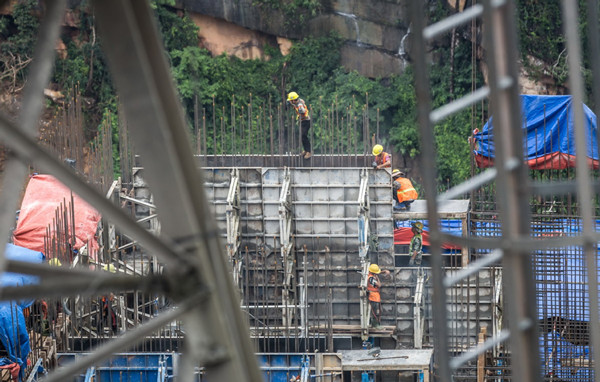Central SOEs to Boost R&D Spending

PowerChina employees undertake construction work in Bolikhamxay province, Laos, in August 2020. [Photo/Xinhua]
China's centrally-administered State-owned enterprises will invest more in research and development to secure higher production efficiency and income during the country's 14th Five-Year Plan period (2021-25), while keeping liabilities under control, the country's top State-asset regulator said on April 16.
The government will guide central SOEs to further grasp the opportunities generated from the new round of technological revolution and industrial transformation during this period. Their focus will be on key areas of emerging industries with bit growth potential like digital, platform and sharing economies. They will cultivate new growth drivers, said Peng Huagang, secretary-general of the State-owned Assets Supervision and Administration Commission of the State Council.
"We will leverage the advantages of massive production data and rich application experiences of central SOEs to accelerate the digital transformation of traditional industries and infrastructure," he said, adding the country will also promote the next-level integration of the digital economy and the real economy, as well as accelerate 5G to empower thousands of industries and achieve large-scale commercial use across the country.
Central SOEs' investment in strategic emerging industries surged by 21.6 percent on a yearly basis to 1.16 trillion yuan ($177.71 billion) in 2020, accounting for 22.1 percent of their total annual investment amount.
Central SOEs saw their net profit grow by 220 percent on a yearly basis to 415.29 billion yuan in the first quarter of this year. They earned 180.79 billion yuan in net profit in March, maintaining double-digit growth over nine consecutive months.
The total operating revenue of central SOEs surged by 30.1 percent on a yearly basis to 7.8 trillion yuan in the first quarter of this year, according to SASAC data.
The government said sectors like petroleum and petrochemicals, metallurgy, military-related industry, construction, mining and power generation saw high net profit growth between January and March this year.
The SASAC has set growth targets for central SOEs this year, including achieving a profit growth rate above that of the national economic output.
Sun Yongcai, chairman and president of China Railway Rolling Stock Corp, the country's largest rolling stock manufacturer by production volume, said in addition to focusing on developing rail transit equipment, the Beijing-headquartered central SOE will deploy more resources to develop wind power equipment, new energy buses and new materials during the 14th Five-Year Plan period.
Apart from gaining the green light from the French government to operate autonomous buses on open roads in Paris in January, CRRC Dalian Co Ltd, a CRRC subsidiary, received an order in February from KiwiRail, New Zealand's State-operated railway company, for 10 new diesel locomotives, which will be in addition to the 63 units bought since 2009.
With the government planning to complete more than 70 percent of the mission for its 2020-22 action plan for SOE reforms, it is vital to promote professional integration between central SOEs, especially those with homogenized businesses and overcapacity, said Li Jin, chief researcher at the China Enterprise Research Institute in Beijing.
The three-year action plan called for renewed efforts to optimize the structure of the State-owned economy to make it more competitive, innovative, influential and risk-resilient.
The SASAC said earlier this month that Sinochem and Chem-China, two central chemical SOEs, are being restructured and merged to form a behemoth.
"The mixed-ownership reform and reorganization of central SOEs have always been in the spotlight to optimize and upgrade China's State-owned assets," said Peng from the SASAC, noting listed companies today have become the main carriers for the mixed-ownership reform.
Central SOEs with mixed-ownership account for more than 70 percent of the total, and can be found especially in areas like civil aviation, telecommunications and petroleum, information from the SASAC showed.
